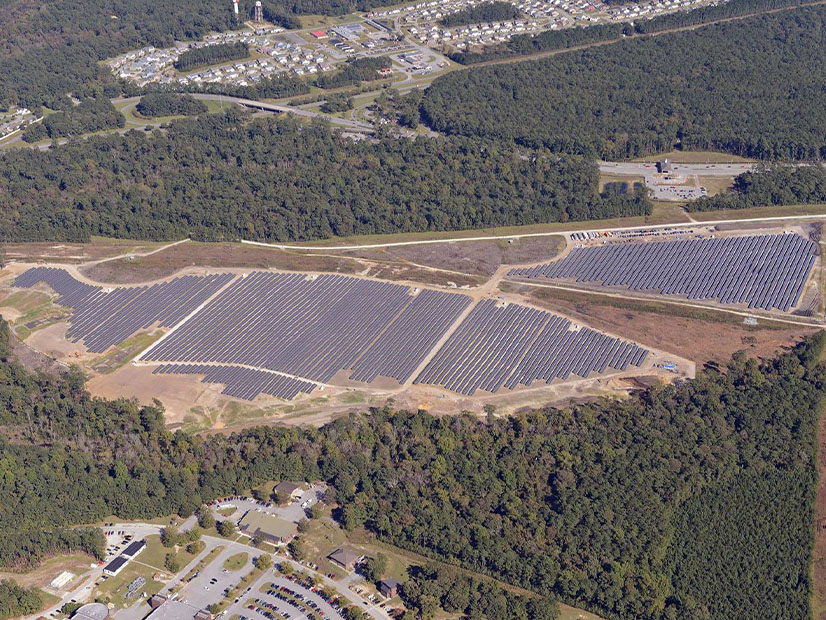The North Carolina Utilities Commission on Friday approved Duke Energy’s first “carbon plan” to comply with the state’s law requiring carbon neutrality by 2050.
The plan does not include any major requirements to invest in new resources, but rather calls on the firm to update its modeling and file a plan with actual investments later. The order discusses different ways of achieving the law, from investing in renewables, to keeping existing nuclear plants running another 20 years, expanding batteries, and even building new natural gas plants to replace coal-fired ones.
“The guidance the General Assembly provided to the commission for this task is clear: The commission must find the least-cost path to compliance with the carbon dioxide emissions-reduction requirements while maintaining or improving the reliability of the electric system,” the NCUC said in its order. “Developing the path to least-cost compliance with the carbon dioxide emissions reductions that the law requires is complex and will, necessarily, be an iterative process given the rapid pace of change of the electric industry.”
The law also requires continued reliability of the system, with the NCUC noting that the transformation of the electric system will present new challenges for system operators as resources dependent on weather grow while new demand such as home heating must be met. The outages some customers saw over the holidays during cold weather underscores the vigilance the regulator will have to employ while overseeing that transition, the commission said.
Duke called the decision “constructive,” noting that the plan will be updated every two years going forward under state law.
The commission’s decision “advances our clean energy transition, supporting a diverse, ‘all of the above’ approach that is essential for long-term resource planning,” Duke said. “We’ve already made incredible progress, retiring two-thirds of our aging coal plants in North Carolina and South Carolina and reducing emissions by more than 40% since 2005; we will continue this ongoing work of lowering carbon emissions to reduce risk for our customers while balancing affordability and reliability.”
The utility said it will file an integrated resource plan with South Carolina regulators this August, which will take into account the carbon plan from its neighboring state, recent federal legislation on infrastructure and clean energy, and other factors relevant to clean planning. Customers in both states deserve a clean energy plan that keeps rates as low as possible, Duke said.
The commission drew fire from environmentalists, with climate advocacy group NC WARN calling its decision to allow Duke to build new natural gas plants “tragic.” It noted that in a quantitative analysis of the plan, Duke called for more than doubling its gas generation by building another 11,700 MW, but opponents have argued that the same capacity needs can be met with solar, wind, energy storage and efficiency.
“Duke Energy is required to obtain permits from the NCUC before it actually builds any more gas-fired power plants,” the group said. “NC WARN and others have vowed to vigorously oppose those applications.”
All of Duke’s modeling showed that new combined cycle natural gas plants would be needed as part of a least-cost energy transition and to help retire the utility’s existing coal plants, the NCUC said in its order. Replacing coal with new natural gas would eliminate the need for additional transmission at certain sites.
The delivery of natural gas to new natural gas plants is uncertain with Mountain Valley Pipeline’s construction still under litigation, but the commission said Duke would be able to pivot to an alternate plan if that pipeline does not go forward. The utility will have to use the most up-to-date information on natural gas prices and pipeline capacity into North Carolina to justify the construction of new natural gas plants under its climate plan, it said.
Without new natural gas plants, the utility said it would not be able to speed up the retirement of its dispatchable coal plants, with its plans to retire 8,400 MW of coal by 2035. New combined cycle plants produce 60% less carbon dioxide than the coal plants they would replace, the NCUC said.
The NCUC determined that planning for 1,200 MW of new combined cycle capacity and 800 MW of combustion turbines makes sense, but the utility needs to file a separate application to actually build such assets.


